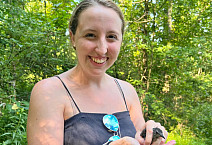Lauren Makuch
Lauren Makuch is a Visiting Assistant Professor of Neuroscience and Psychology at Ursinus College. A Pennsylvania native, she received her B.S. in Biochemistry and Molecular Biology from Penn State University. Lauren later earned her Ph.D. in Neuroscience from the Johns Hopkins University School of Medicine. After completing a two-year postdoctoral research position at the Picower Institute of Learning and Memory at MIT, Lauren joined Ursinus in 2015.
Lauren is a cellular/molecular neuroscientist who has loved learning about science since she was a small child. She is interested in understanding the biochemical and morphological changes that take place in the brain after learning. Lauren is also interested in bringing primary research into the classroom to allow students to make novel discoveries while completing course curriculum. She is excited to implement neuroscience research techniques in the classroom experience at Ursinus.
Department
Degrees
- B.S., Penn State University
- Ph.D., Johns Hopkins University School of Medicine
Teaching
- Fundamentals of Neuroscience
- Behavioral Neuroscience
- Advanced Research Methods in Behavioral Neuroscience
Research Interests
Learning and memory at the molecular level
Implementing novel research as part of course curriculum
Recent Work
Duning K, Wennmann DO, Bokemeyer A, Reissner C, Wersching H, Thomas C, Buschert J, Guske K, Franzke V, Flöel A, Lohmann H, Knecht S, Brand SM, Pöter M, Rescher U, Missler M, Seelheim P, Pröpper C, Boeckers TM, Makuch L, Huganir R, Weide T, Brand E, Pavenstädt H, Kremerskothen J. (2013) Common exonic missense variants in the C2 domain of the human KIBRA protein modify lipid binding and cognitive performance. Transl Psychiatry.
Makuch L, Volk L, Anggono V, Johnson RC, Yu Y, Duning K, Kremerskothen J, Xia J, Takamiya K, and Huganir RL. (2011) Regulation of AMPA Receptor Function by the Human Memory-Associated Gene KIBRA. Neuron 71: 1022-1029.
While experience modulates brain function throughout life, much research has identified early experience as the most impactful influence. Our research focuses on the effects of early experience on learning and memory, social behavior, and motor function in the adult.




